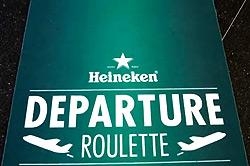research
Sharing Brands: More Than Just A Twitter Handle
- by Karl Greenberg , October 3, 2013
 Sharing
your brand with consumers is marketing organic chemistry in which marketers have to get the right mix of brand perception, alignment with consumer values and ambition, transparency and several other
elements that catalyze affection and trust for a the brand, and intent to purchase its products.
Sharing
your brand with consumers is marketing organic chemistry in which marketers have to get the right mix of brand perception, alignment with consumer values and ambition, transparency and several other
elements that catalyze affection and trust for a the brand, and intent to purchase its products. Edelman, best known (outside of its PR work) for its yearly Trust Barometer, has come out with a distillation of brand sharing based on what consumers aver about what makes them feel an affinity for a brand.
The BrandShare study sampled 11,000 consumers in the U.S., UK, Canada, France, Germany, Brazil, India and China, evaluated approximately 100 local and multinational brands per country and gauged how consumers felt about them based on six key variables: shared dialog, shared experience, shared goals, shared values, shared product and shared history. Over 90% of respondents in eight countries want to do business with brands that share their beliefs, per the study. About half want brands to be more transparent about how products are sourced, and 43% want brands to do more to give back.
advertisement
advertisement
Ninety-one percent of respondents said they want to have a hand in the design and development process; 91% said they want brands to enable their personal goals. And people want to be asked what they need instead of being told how to get it, especially in market categories where products are complex -- financial services and technology, for example.
The study cites some brands that get some of the elements right:
- Axe's brand community managers, "Axe Voices," create and distribute lifestyle and product content across social channels and spend hours every day responding to all comment or messages, the study notes.
- Heineken's "Departure Roulette" is an airport-based experience in which people can trade their tickets for a trip to an unknown destination, aligning with people’s desire for adventure.
- Adidas gets kudos for aligning with aspirations: the brand recently asked dozens of women to photograph something that motivated them to work out and the result challenged the brand’s preconceptions about people’s goals and informed new product development.
- Volkswagen's "Why VW" platform showcases its history as a brand, letting people tell stories about their own history with the brand, and showcases them.
Jennifer Cohan, global chair of consumer marketing at Edelman, says the study offers up three key takeaways. "First, we believe that the marketing communications needs to change." She tells Marketing Daily that what tends to happen is product marketing happens behind closed doors "And only when it's 'prime time' do they emerge to consumers." She notes that product development and marketing tend to be linear: the product is readied and the consumer is the end point.
"What we find is that people want to be involved. They want to have a real discussion about what's important -- they care about -- and they want the brand to respond." And they want brands to be transparent and open with them, she explains. "What it means is brands should incorporate the consumer every step of the way, listening to what people talk about and create opportunities for them to be involved in things like beta testing."
She also argues for a merging of brand marketing and corporate communications to create brand narrative -- and that there's an opportunity for brands to reconsider how brands are using existing channels to extract value. "Don't just think of social communities for content but use them to ask questions."




